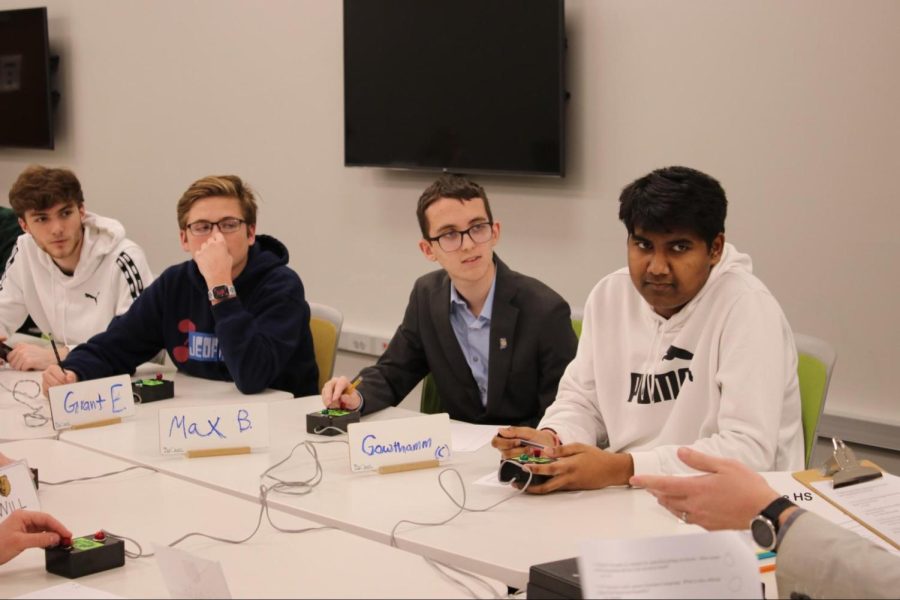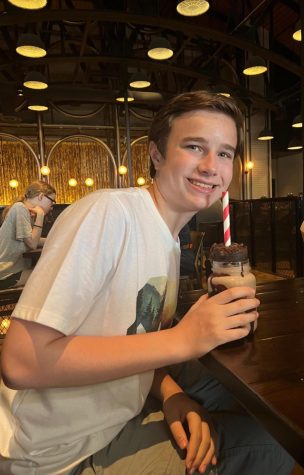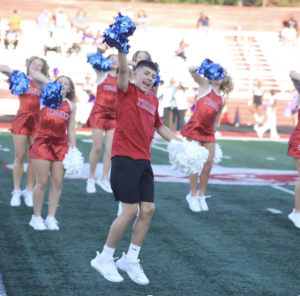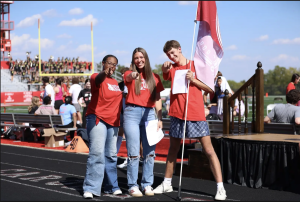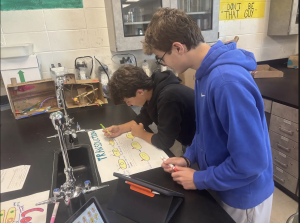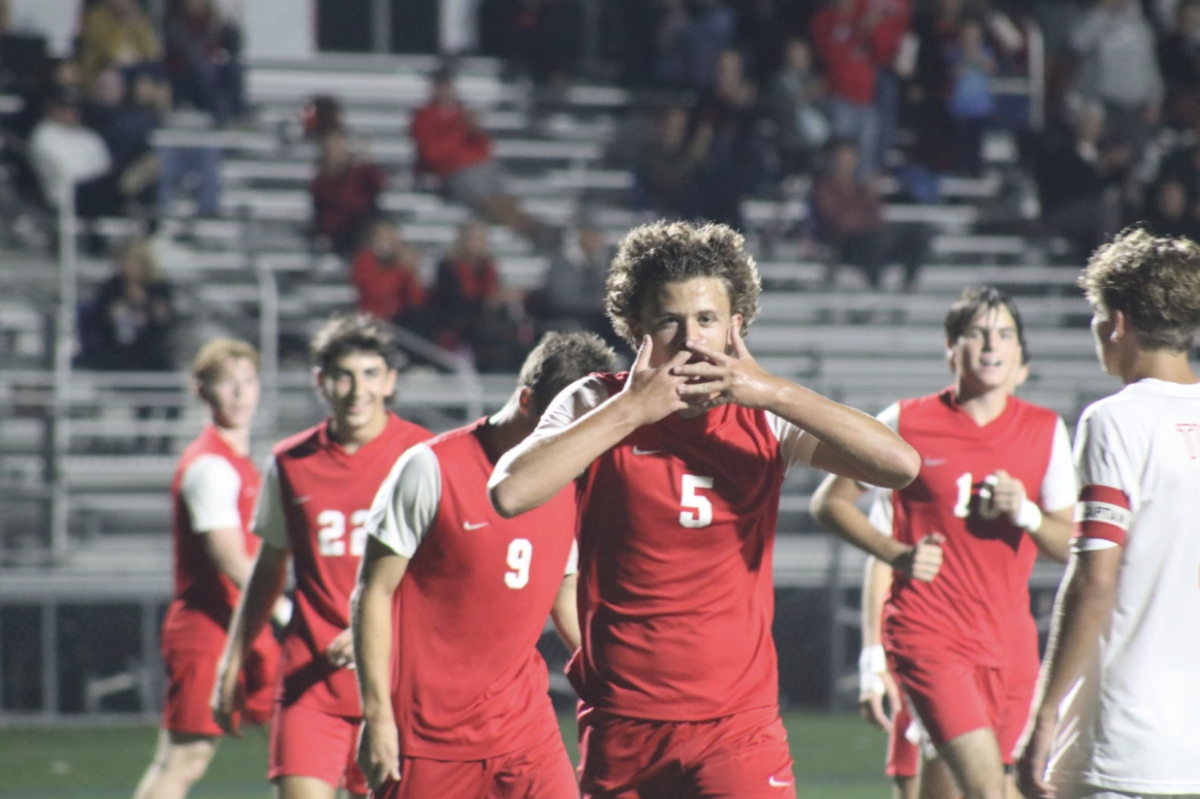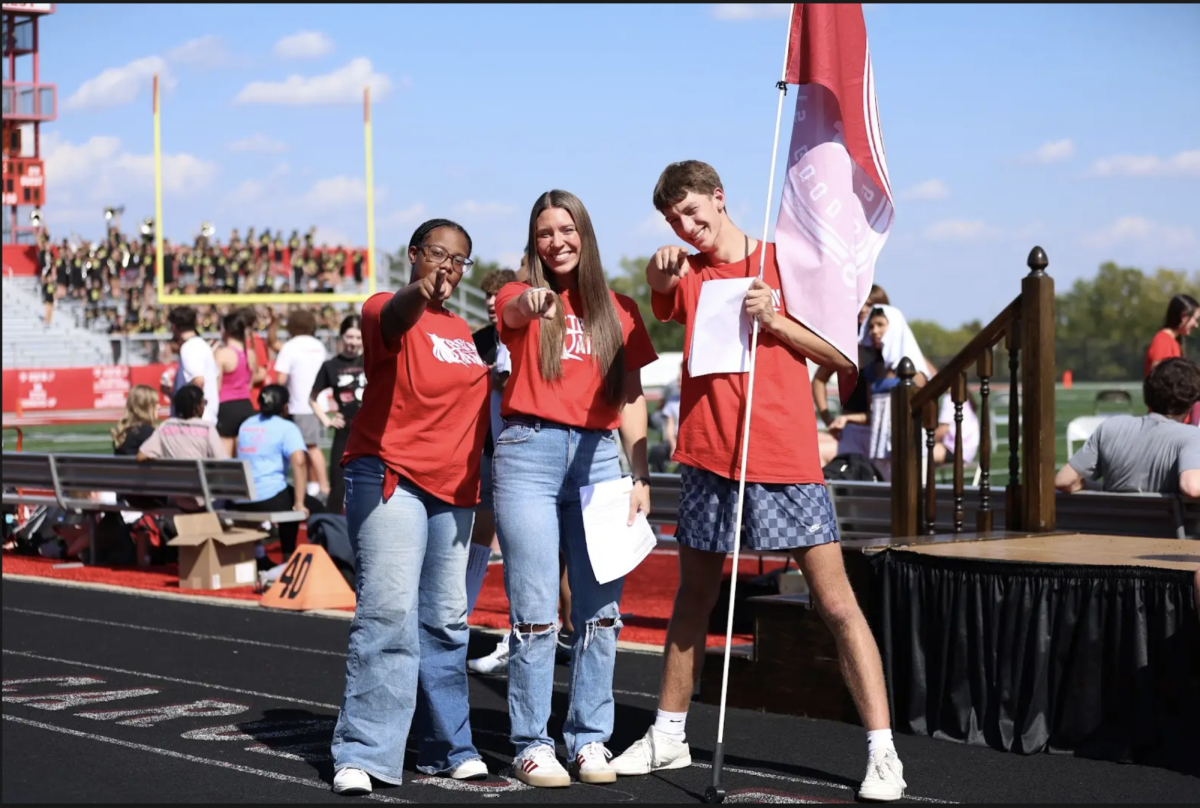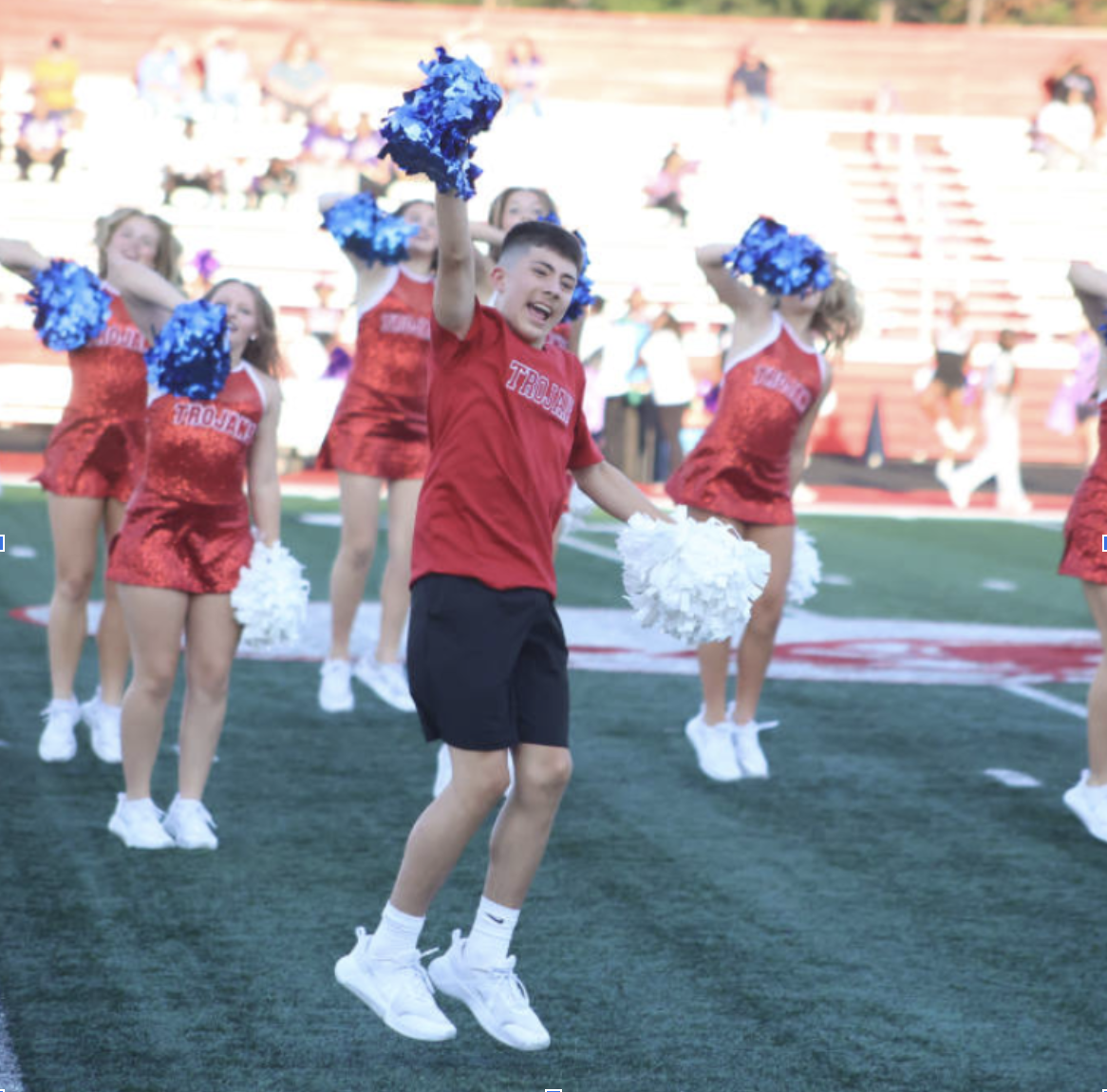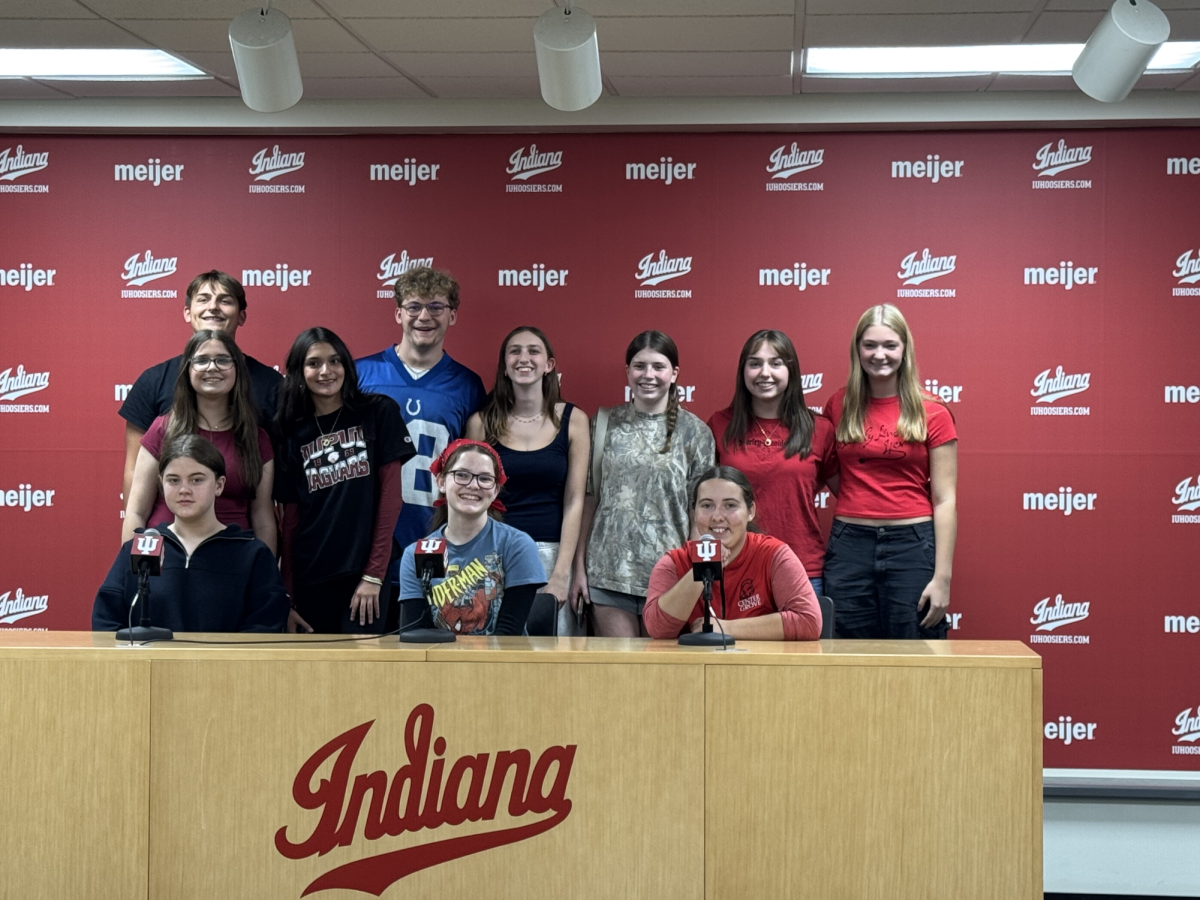Playing brain games
Quiz Bowl team achieves success, looks ahead to postseason
Seniors Jacob Thornton, Grant Embrey, Max Barton and Gowthamm Mandala hold buzzers at a Quiz Bowl competition in December.
February 15, 2023
The excitement in the room is palpable. Members of the Quiz Bowl team sense the tension of the other team getting closer and closer, catching up with each question answered correctly. The teams analyze the situation. The last question is asked, and a CG student buzzes in with a lightning-fast reaction. They carefully state the answer and wait for the verdict. After what feels like an eternity later, the coach gives them an answer and secures their team’s lead.
Every Tuesday and Thursday, Quiz Bowl members meet in Room 284 after school to practice trivia. The club, led by social studies teacher Jonathan Rogers, finished their regular season with a 7-0 record in the White River Academic League (WRAL).
“Quiz Bowl is a Jeopardy-style trivia game,” senior Max Barton said. “I always tell people it’s Jeopardy, but with teams. You both work by yourself and with your team. Two teams play each other and see basically just who knows more or if both of you know about something, who knows more the quickest.”
The team competes in two quiz formats: WRAL and National Academic Quiz Tournament (NATQT).
“WRAL is the White River Academic League,” senior Jacob Thornton said. “We play with teams from around Indiana and things like that, more local teams. NAQT is the National Academic Quiz Tournament, which is the national format that we will be playing when we compete at state, and when we hopefully go to nationals.”
The state format has one question with more and more information revealed as it is read and teams will rush to think of the answer before the other team.
“So sometimes we play, we try to play fast and we try to get points,” Rogers said. “If you get that question right, you get three bonus questions where you can get more points. So it behooves you to buzz in and get the question right. In the bonus questions, you can communicate with your teammates, but at the beginning it’s only you have to buzz in. So that’s where teamwork comes into play and listening and focus and trying to build each other up, trying out the best players you can.”
The team recently had a NAQT tournament at Purdue. However, most of their competitions come from WRAL.
“We only have one tournament for WRAL, but typically, the competition would be two teams,” Thornton said. “They just sit down, and they go through the format in answering questions. Tournaments are structured differently where there are brackets that we usually go through. It starts out with typically five preliminary matches. At the end of those, the top teams for each division in that preliminary will be placed into another division in the bracket and some matches will play out through the bracket. Then the top teams from those will get placed for the finals.”
Because the competitions can be stressful, the team has to work to maintain a high morale. This can be through positive reinforcement or even just playing games like “Hangman” or “Down by the Banks.” However, the team still can go on a losing streak and lose that morale.
“I think we may mitigate it purely by the fact that we know that we’re a winning team, that we can do what we do,” Barton said. “And we aren’t the greatest at mitigating a loss in the world, but if somebody does go and get a question or two right in a row or if somebody starts doing really good we’re also very good at picking up really quickly and having a ton of team spirit behind that, standing behind that person, cheering about the fact that they’ve just did really great for the team.”
The competition motivates the players to practice hard. While there is a time and place for studying, they mainly prepare by playing games with each other.
“Some of the really good teams study, like religiously, but for us we play games,” Thornton said. “And what happens is a lot of the same topics are repeated. So you get exposed to the same things. Eventually you pick stuff up and then also on the way to our matches. There’s a website from NATQT. It just has a bunch of the stuff that you have to know and we make our own trivia questions based on that stuff. Or if we’re really curious, some of us will just go look stuff up on our own, but really to prepare, we just practice, just playing games constantly.”
Another key to the team’s success is its structure, which helps organize who would be most effective at any given moment. At the beginning of this year, club leaders wrote a constitution for the club that established different roles based on different topics. For example, Thornton is the vice captain of chemistry.
“There’s the captain and the vice captain who are basically working with our sponsors to make sure that everything happens when it needs to,” Thornton said. “Then we have the vice captains of each subject. They are just basically experts, and they’re there to give additional input and base for any major decisions that need to happen. Then we created a finance committee that is in charge of dealing with all the funds that the club gets.”
Thornton hopes the structure of the club will establish a line of succession for leadership that will make the club overall more efficient.
“It’s a really messy structure, but we hope to address a lot of issues that we solve from other clubs, the way their governments work there,” Thornton said. “ A lot of the things that happen in other clubs seem like the people just vote for their friends to get positions and we want to stop something like that from happening. So we created an entirely new structure that is completely unique to our club to ensure that positions can move on to people who are actually deserving of it rather than just people voting for their friends and popularity contests.”
Another problem the club wanted to address this year was money. The club previously did not have to worry about funds because of a past team that won $10,000 on the game show “Brain Games” in 2009.
“We have been using the stored money from that $10,000 and it ran out pretty much at the end of last year,” Mandala said. “So if we wanted a season this year because we have to pay for the tournament, we have to pay for the practice papers and the practice questions.”
The club’s finance committee worked with teachers to reach out for fundraising opportunities, including for a Panda Express scholarship, to fund this year’s competition costs.
“That’s our biggest accomplishment,” Mandala said. “Because if we didn’t do that, the club is done for. There wouldn’t be a club in the coming years. But we made sure that we set up a system where you’ll have a good leadership structure through the next couple of years and the years after that, but also a good way to improve your income and funds for future years.”
The team has been able to raise nearly $4,000 to be able to go to nationals. By partnering with the Center Grove Education Foundation (CGEF), the team raised more money at a local trivia night, where they offered their assistance on questions in exchange for a donation. They hope the CGEF could be a sustainable resource for raising money in the future.
“We have set up a donation page with the Center Grove Education Foundation, the CGEF, this year, and they’ve created us a website similar to how robotics did last year, where community members can go on, click the link and donate however much money they can,” Mandala said.
The team has grown not only in formality but also size. The success makes many hopeful for going farther than they ever have before.
“Where three years past, we would qualify for nationals but never even thought about going for, last year we did and never had the chance to; this year we’re actually thinking about going,” Barton said.
Rogers hopes more people will come to the competitions to see why the team is so passionate about Quiz Bowl and to understand what makes it so special to be there.
“To hear how fast these kids can work sometimes, and how correct they can be about some of the answers or like sometimes when they’re just almost there,” Rogers said. “It really can be very suspenseful and fun. So I’d love to give more people a chance to see what that looks like. It’s fun to watch trivia. It’s fun to watch ‘Jeopardy.’ There’s a reason why 9 million people do it because sometimes it’s fun to know things and sometimes the contestants don’t know something. You’re like, ‘I know that.’”


